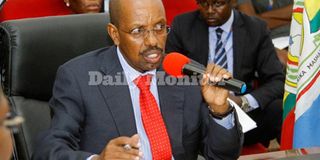Debt Crisis: Muhakanizi receives 10 loan proposals to government daily

Dismissed proposal. Keith Muhakanizi
What you need to know:
- The proposals are from banks, development funds and bilateral partners eager to have their huge portfolios lent out.
- The World Bank country manager for Uganda, Christina Malmberg Calvo said Uganda's public debt is still in sustainable levels, emphasising that the Bank's loans are long-term and interest free, attracting only an administrative fee.
The Secretary to the Treasury, Mr Keith Muhakanizi says creditors have so much money that they are looking for all ways to lend to the government.
Mr Muhakanizi said that on a daily basis, he receives an average of 10 requests from creditors, both local and international, who want to lend to the government.
According to him, if he alone receives that many requests then the number should be more when those received by the president, the prime minister and the finance minister are totalled.
Speaking in Kampala Monday, Mr Muhakanizi said unlike two decades ago when there was mainly the World Bank and the African Development Bank, today the number has grown significantly and they are all keen to lend to the government.
The proposals are from banks, development funds and bilateral partners eager to have their huge portfolios lent out.
Mr Muhakanizi said although borrowing is not necessarily bad, special care should be taken about unsustainable borrowing, adding that borrowing is also good for economic growth and development.
He said the good news for Uganda is that she is no yet debt-stressed and the borrowing is still in sustainable range.
Uganda's debt-to-GDP ratio increased from 35 percent in 2016 to the current 38.6 percent.
Both the International Monetary Fund and the government project that Uganda's debt-to-GDP ratio will increase to 43 percent by 2022 before peaking and then beginning to decline.
This is on account of the heavy investments in oil and gas and infrastructure projects.
The World Bank country manager for Uganda, Christina Malmberg Calvo said Uganda's public debt is still in sustainable levels, emphasising that the Bank's loans are long-term and interest free, attracting only an administrative fee.
Calvo said the Bank's loans are also targeted at things that improve people's lives and bring down poverty.
Concerns have been growing over Uganda's ability to borrow so much money for poorly crafted projects and inability to absorb the monies or use them appropriately.
The World Bank in a report last year reported that not a single project in Uganda has run from conception to operationalisation without hiccups like delays, poor or no feasibility studies, corruption, mismanagement and low absorptive capacity to mention but a few.
Based on that, the World Bank last year suspended further lending to Uganda and only lifted the ban recently.




